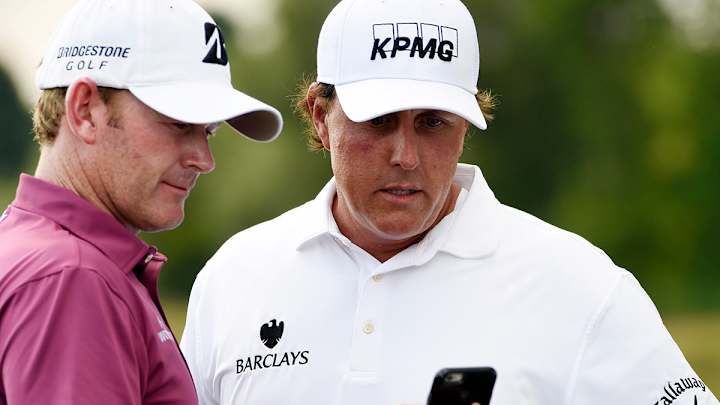There's a Better, Golfier Way to Pick the PIP Winner on the PGA Tour

As his sign-off to 2021, the ever-clever Phil Mickelson ended the year with a Twitter flash-bang in a short ode to the age of diversion and disinformation:
I’d like to thank all the crazies (and real supporters too) for…………………
— Phil Mickelson (@PhilMickelson) December 29, 2021
Helping me win the PiP!!
To get the 2nd half of the money I have to add an event I haven’t played in awhile. See you in Kapalua😘 🏌️♂️🏄♂️🏊
P.S. I’ll try and find another hot controversial topic soon👍
The PIP is the PGA Tour’s Player Impact Program, which for the longest time was a secret scheme to pay a $40 million to the top 10 players who, in the Tour’s metrics, have the most “impact” on the game in 2021. The winner gets $8 million. Next year, the program increases to $50 million with the winner cashing in for $10 million.
Despite his Twitter bomb that merely made noise, Mickelson didn’t win. Not yet and probably not at all. At best, he will finish second to Tiger Woods, a result to which Lefty has become accustomed over the last 25 years.
After the results are verified by an independent auditor — is that really necessary? — the winner will be announced in mid-February to the Tour membership after the Tour had originally maintained it would not reveal the results at all. The public will only find out when a Tour player or several leaks the outcome to the media.
The PIP is kind of cute, maybe, but how, exactly, does it advance the cause of golf and make the game, and the rank-and-file people who play it, better? Golf, especially at the professional level, is about rewarding performance. We’re looking for players, not influencers. With the PIP, an insane amount of money is being paid out for doing absolutely nothing, like Rick Shiels and Paige Spirinac, the two top stars in golf social media. It’s so many empty calories.
Five categories were used to determine the PIP score: Google search frequency, social media reach, Nielsen score (TV time), number of mentions in global media (measured by Meltwater) and Q-score (name recognition and appeal).
“For us, it’s all about getting our players to engage in our game, help grow our Tour, and help grow their own respective brands,” PGA Tour commissioner Jay Monahan said at the Tour Championship.
For an organization whose cornerstone is charity, rewarding players for molding themselves into celebrities is not only shallow and shortsighted but turns a blind eye to two of golf’s enduring qualities — humility and giving back — that separates our game from much of the useless bravado and cacophony of some high-profile team sports.
Growing players’ brands? What does that even mean? Followers, page views, likes and clicks benefit players only by creating the opportunity for more lucrative endorsement contracts. And what do golf fans get out of this arrangement? Nothing comes to mind.
Making a real difference in the lives of others should be the metric for measuring substantive impact. In that case, here are five categories for consideration:
- Most autographs signed
- Most hospitals visited
- Most resources donated to junior player development — equipment, instruction and personal participation
- Most time volunteered to help those in need
- Most charity dollars personally generated
If Monahan really cared about meaningful player impact instead of creating superficial priorities that only financially benefit the Tour and its sponsors, he should have said:
“For us, it’s all about personal contact with our fans, particularly kids; lifting up those less fortunate; growing the game from the grassroots through junior participation outside the First Tee; and raising money for charitable causes. Our tournaments have raised more than $3 billion for charity but we feel the PGA Tour is better when our players give of themselves inside and outside the ropes.”
To Mickelson’s credit, he probably signs more autographs than the next five players on that list combined. And there are dozens of players who every year generously give back to their communities in significant ways. Let’s celebrate those players and give them the PIP money, requiring that at least half of it be donated to charity.
Don’t make the top end of golf richer for no apparent reason. Instead, strive to make golf better through selfless giving. That’s worthwhile and priceless impact for which no social media or Q score can ever hope to measure.
Related: Mickelson Reportedly Wins PGA Tour's $8 Million PIP Bonus

Purkey has been writing about all things golf for more than 30 years, working at the highest level at publications such as Golf Magazine and Global Golf Post. He is an avid golfer, with a handicap too low for his ability. Purkey lives in Charlotte, N.C.